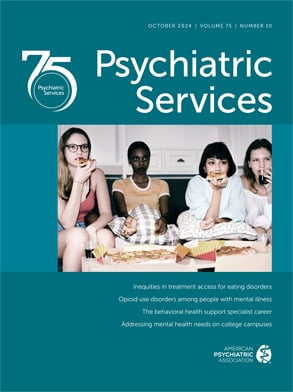To the Editor: In psychiatric hospitals, residents watch many hours of television each day. Because it is so easy and nonchallenging, watching television often becomes a "default" activity (
1). Mental health professionals have become concerned about the effects of television on institutionalized individuals (
2,
3), whose intellectual, psychological, and social handicaps render them particularly vulnerable to the negative effects of television watching (
4). We therefore investigated whether keeping television sets off for six hours a day would increase the time that forensic inpatients spend in therapeutic activities.
Twenty-five male patients (23 insanity acquitees and two correctional inmates) in a long-term treatment unit at our maximum-security facility participated in the study. Each week, every patient entered his planned therapeutic activities on a schedule sheet; staff signed the sheets as each activity was completed. All sheets were screened for fraudulent signatures.
After 62 weeks of such recording, all television sets on the unit were kept off from 8:30 to 11:30 a.m. and from 1 to 4 p.m. from Monday through Friday. Staff and patients were informed that the purpose of this intervention was to create some "quiet time" on the ward.
In the 62 weeks before the intervention, patients recorded a mean± SD of 22.8±3.3 hours a week of therapeutic activities. In the next 52 weeks after their exposure to television was reduced, they spent a mean of 23.8±2.1 hours in therapeutic activities, a statistically significant increase (F=3.48, df=1,112, p<.05; Cohen's d=.37).
Although the increase of only one hour a week in therapeutic activities appears small, we would argue that it is nonetheless clinically important because it represents a substantial number of hours per year. Even a modest increase in treatment is a worthwhile achievement for these long-term forensic patients, given the importance of inducing change in their behavior and the high cost of their care.
In our view, the benefits of this intervention outweighed any detrimental effects. No increase in violence and no legal action arose as a result of the intervention. While the television was off, patients either participated in therapeutic activities, read in the common rooms, or conversed among themselves and with staff. There was no other obvious explanation for the increase in patients' participation in therapeutic activities.
As far as we have been able to establish, the regulation of television exposure in institutional settings such as psychiatric hospitals has not been based on careful studies of the impact of television on patients. Although inpatients can gain potential benefits from watching television, such as learning, socializing, relief from boredom, and continuity with outside life, these benefits must be weighed against the potential risks.
The public has become increasingly concerned about the negative effects of television on one vulnerable population—children, hence the advent of the "V-chip," a device designed to block objectionable television programs. Forensic and other mental health treaters arguably have a duty to ensure that their patients fully participate in the treatment programs available. We have shown that turning off television sets in a forensic ward is one way to foster increased participation.

